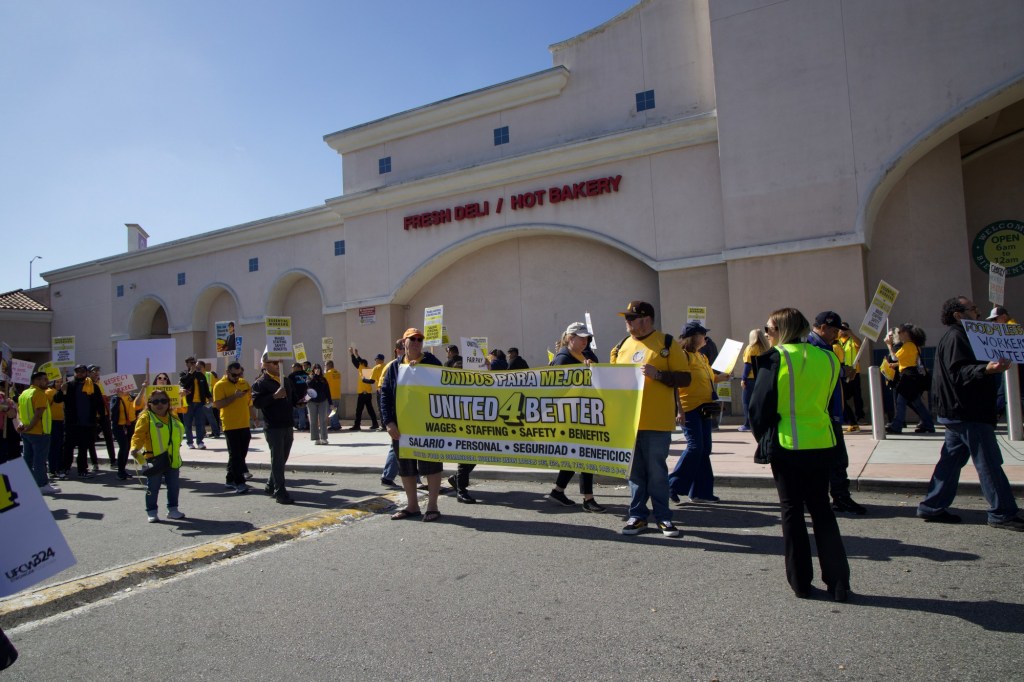Nearly 6,000 Food 4 Less and Foods Co. workers, representing local employees, rallied in Baldwin Park on Thursday, March 7, 2024, to demand fairness, fair wages and increased safety measures ahead of their contract expiration on June 8. (Photo courtesy of the United Food and Commercial Workers Union)
The union representing thousands of Food for Less workers announced Wednesday that it had failed to reach an agreement on a new contract after two days of negotiations with management but had agreed to return to the negotiating table on Monday to avoid a strike.
Food 4 Less operates 15 stores in the Los Angeles area and is a subsidiary of Kroger Co., which also owns Ralphs. The company's roughly 6,000 employees, represented by the United Food and Commercial Workers union's Locals 8GS, 135, 324, 770, 1167, 1428 and 1442, voted last week to authorize a strike.
RELATED: More than 600 Smart & Final warehouse workers strike in Commerce and Riverside
“On Monday, we returned to the bargaining table, prepared to negotiate for however long we wanted to get the wages, hours and benefits we need to support our families and improve our lives,” the union said in a statement Wednesday. “We negotiated late into the night and returned first thing in the morning to fight for the contract we need, but despite more than 26 hours of negotiations over the past two days, the company continues to refuse to make any meaningful progress.”
Kroger spokesman Salvador Ramirez said the company was “disappointed with the outcome and looks forward to the union returning to the negotiating table. From the beginning, our focus has been on getting more pay for our associates.”
“We presented a historic proposal with more than $70 million in wage investments, industry-leading health care and retirement benefits,” he added. “Our employees are the heart of our company, and we will continue to balance wage investments with the overall well-being of our employees while doing everything we can to keep food affordable for our customers. Our stores will remain open to serve their communities.”
The union's demands include higher wages and improved safety. The union's contract expired on June 8.
“From the beginning, Food 4 Less/Foods Co. members have come together to support the contract we deserve — one that allows us to continue serving our customers and providing our communities with access to the fresh food they need to feed their families,” UFCW officials said in a statement Wednesday.
“Our work should be valued just like any other benefit-earning union grocer. Throughout this process, we are disappointed that our employer and its parent company, Kroger, have disrespected us and refused to acknowledge our hard work and the unfairness of their own grocery contract. While we were unable to reach an agreement today, we remain committed to negotiating effectively with Food 4 Less/Foods Co and want to thank our customers and the community for their continued support. We are currently evaluating all options and any further actions that may be required.”
Earlier this month, the company announced a proposal to the union to raise pay for full-time cashiers with four years of experience to $25.80 an hour by 2026, with annual salaries of at least $50,000. Under the proposal, employee health insurance premiums would not increase over the life of the three-year contract.
“At Food 4 Less/Foods, our hard-working, dedicated employees are the heart of our company, and our goal is to continue to provide market-competitive wages and benefits that we know are so important to our employees and their families,” Food 4 Less/Foods President Brian Kaltenbach said in a statement.
“We will continue to do all we can to balance investing in wages and overall well-being while keeping food affordable for our customers.”
On May 22, the union local filed an unfair labor practice complaint against Food 4 Less/Foods, alleging that the company violated workers' rights to negotiate and represent themselves. Union officials said the company illegally surveilled workers, barred them from participating in union activities, prevented them from discussing with union representatives, and unilaterally changed their contracts.



